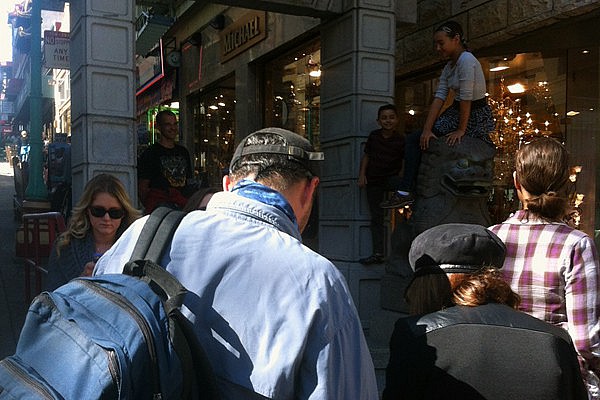
A Message to Tourists Visiting San Francisco’s Chinatown
Here is an adjective that describes San Francisco’s Chinatown: historic. San Francisco is home to the first Chinatown in the United States and the migration hub for Asian immigrants migrating to other parts of the country.
Groups of tourists from this country, and around the world, flock to this ethnic enclave every year, displaying fetish-like behavior with their giggles, excitement and awe.
This giddiness introduces another adjective summing San Francisco’s Chinatown: exotic. Tourists purchase cultural commodities – a fan with a Mao Zedong picture, for instance, or a Chinese peasant hat – that supposedly resemble the Chinese-American culture from decades-old thrift stores. Tourists are enticed into restaurants selling Chinese food by Chinese ladies standing on sidewalks, food that may or may not contain flavor enhancers (who really knows). These women, it should be said, dress like concubines, while attracting tourists’ attention with their pamphlets.
Even politicians who visit San Francisco’s Chinatown – I do not pretend to know why – revert to touristy behavior. President Bill Clinton, July 23, 1996, was photographed biting on a moon cake purchased at Eastern Bakery on Grant Street. President Barack Obama, February 16 of this year, ordered dim sum from Great Eastern Restaurant on Jackson.
Tourists, in essence, enhance the history and the exoticism shaping San Francisco’s Chinatown – a site that will continue attracting tourists, so long as it exists.
But San Francisco’s Chinatown is not a museum, nor is it an amusement park. This Chinatown, like other Chinatowns, is home to Chinese tenants, residents who include, but are not limited to, Chinese elders, Chinese-American youths and future bloodlines.
Tourists are doing a disservice to these Chinatown residents, when a family of five clutters the sidewalk by walking in a horizontal line, ventures into the streets to take pictures of Chinese lanterns suspended in the air, or discharges their recently purchased firecrackers on the ground. Tourists are disrupting the quality of life of these tenants, like me, with their quirky behavior – a behavior that makes tourists look like inconsiderate clowns.
These Chinatown tenants are not a part of the Chinatown attraction. They are a part of the Chinatown community, which means they are San Francisco residents. They should not be treated like inhuman, inanimate objects because they are not as exotic as the exotic commodities themselves.
Which leads to my suggestion: stop acting like exotic tourists.
Stop already!
Photo: David Ka Wai Pan
Editor’s Note: This article is purely the opinion of the author and does not reflect the views and opinions of Dumpling Magazine LLC or its partners and staff in whole or in part.
Aug. 10, 2012: Fixed an adjective in the second to last sentence for clarification.
